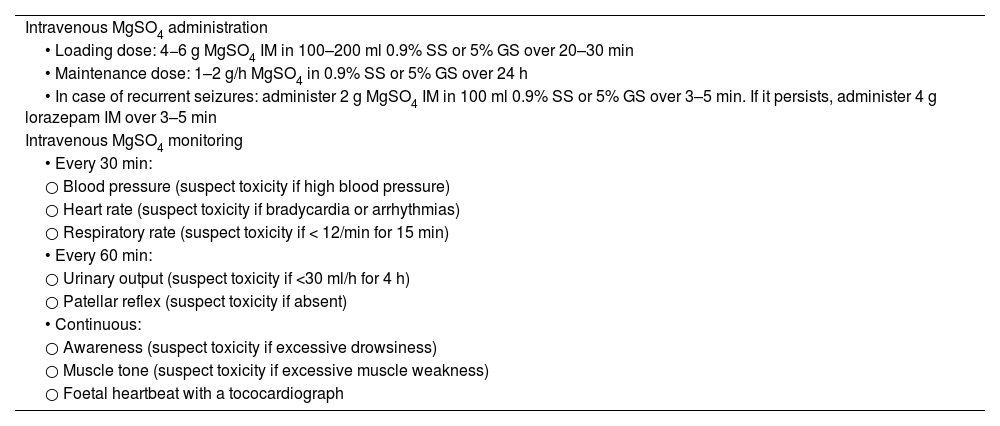The main causes of maternal mortality are comorbidities, hypertensive pregnancy syndrome, obstetric haemorrhage, and maternal sepsis. For this reason, uterotonics, magnesium sulphate, and antibiotics are essential tools in the management of obstetric patients during labour and in the peripartum period. These drugs are widely used by anaesthesiologists in all departments, and play a crucial role in treatment and patient safety.
For the purpose of this narrative review, we performed a detailed search of medical databases and selected studies describing the use of these drugs in patients during pregnancy, delivery and the pospartum period.
Uterotonics, above all oxytocin, play an important role in the prevention and treatment of pospartum haemorrhage, and various studies have shown that in obstetric procedures, such as scheduled and emergency caesarean section, they are effective at lower doses than those hitherto accepted. We also discuss the use of carbetocin as an effective alternative that has a therapeutic advantage in certain clinical circumstances.
Magnesium sulphate is the gold standard in the prevention and treatment of eclampsia, and also plays a neuroprotective role in preterm infants. We describe the precautions to be taken during magnesium administration.
Finally, we discuss the importance of understanding microbiology and the pharmacology of antibiotics in the management of obstetric infection and endometritis, and draw attention to the latest trends in antibiotic regimens in labour and caesarean section.
Las principales causas de mortalidad materna corresponden a las comorbilidades asociadas, el síndrome hipertensivo del embarazo, la hemorragia obstétrica y la sepsis materna. Es por esto que los uterotónicos, el sulfato de magnesio y los antibióticos son fármacos esenciales en el manejo de la paciente obstétrica durante el parto y el periodo periparto. Son ampliamente utilizados por los anestesiólogos en forma transversal y juegan un papel crucial en la seguridad y el tratamiento de dichas complicaciones. En esta revisión narrativa se realiza una búsqueda exhaustiva dentro de las bases de datos médicas y de una selección de estudios que abordan información relacionada con pacientes durante el embarazo, parto y postparto sometidas a procedimientos con anestesia. En cuanto a los uterotónicos, se enfatiza su importancia en la prevención y tratamiento de la hemorragia postparto.
La oxitocina es el uterotónico de elección y se presentan estudios que avalan su efectividad en dosis más bajas que las hasta ahora aceptadas, para diferentes situaciones obstétricas como cesáreas electivas y de urgencia.
Además, se discute el uso de carbetocina como una alternativa terapéutica eficaz con una ventaja terapéutica en ciertas condiciones clínicas.
Con relación al sulfato de magnesio, se destaca su papel en la prevención y tratamiento de la eclampsia junto con el potencial rol neuroprotector neonatal en el parto pretérmino. Además, se mencionan las precauciones debidas durante su administración.
Por último, con relación a los antibióticos, se subraya su evolución continua y la importanciaen el manejo de infecciones puerperales y endometritis. Se enfatiza la necesidad de un mayorconocimiento de la farmacología y la microbiología en el contexto obstétrico y los posiblescambios en los esquemas antibióticos en el trabajo de parto y en las cesáreas.










